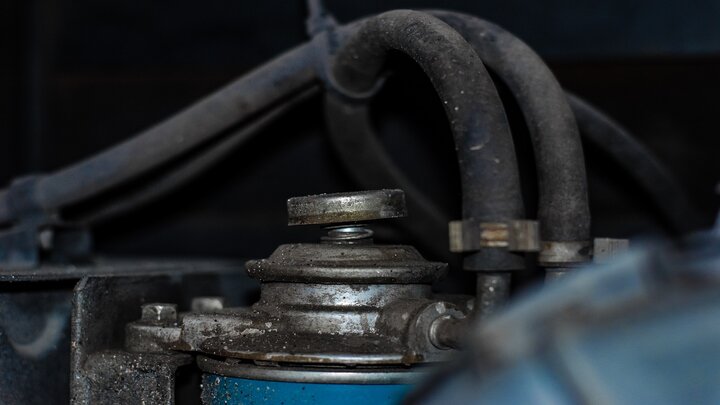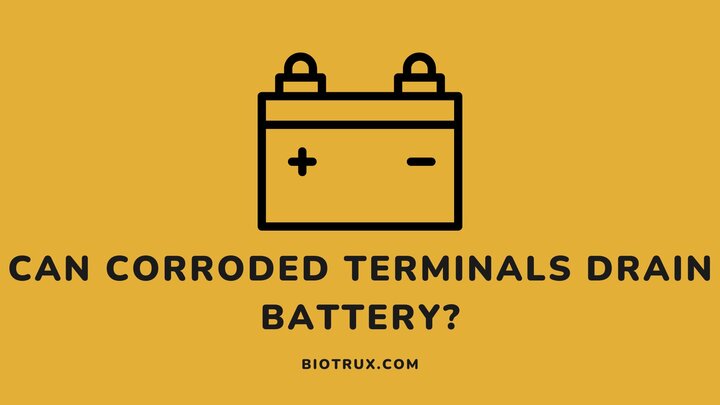Battery terminals are the electrical ports that connect a device to its battery. In this case, they connect your car to its battery. When a car battery terminal(s) become corroded, they will not drain the battery.
Such events usually indicate that your battery is leaking and gradually losing capacity. Hence, such a battery will struggle to start your car because it has to overcome a high resistance caused by corrosion.
To fully understand both scenarios, I will walk you through the common causes of corroded terminals, and what to expect. You will also learn about how to fix and prevent this problem.
Common Causes of Corroded Battery Terminal
Car batteries contain sulfuric acid, producing hydrogen gas capable of weakening the battery. When these gases escape and react with the atmosphere, a corrosive reaction ensues with salt and moisture being the primary catalysts.
This is why corrosion occurs mostly on the negative terminal, which is another symptom of an undercharged battery. Now that you know the series of events that lead to corroded terminals, let’s take a look at some of its common causes:
1. Battery age
It is only natural for a battery to deteriorate after working for many years. However, deterioration may not be the only problem. Some symptoms like plastic swelling and leakages also accompany such decline.
These symptoms sometimes expose metallic terminals to corrosive debris and residue.
2. Overfilling with water
Some batteries require water for their acidic content to function. However, when you fill them with excessive water, these batteries will overflow and expose the terminal to water leading to corrosion.
3. Electrolyte leakage
Aside from water, corrosion or residue accumulation will likely occur when electrolyte leaks from a car battery and gets in contact with its terminals. The best way to deal with this is to replace such a battery.
4. Reaction on copper
When sulfuric gas escapes and comes in contact with copper clamps, it forms copper sulfate. This chemical reaction often leaves copper sulfate residue on the terminals resulting in corrosion.
5. Overcharging the car battery
Overcharging a car battery is one of the most common causes of corroded terminals. This is because the process increases heat and forces the battery to expand.
This results in releasing the battery’s electrolytes which often come in contact with the terminals and corrode them.
Can Corroded Terminals Drain a Car Battery?

When the word ‘drain’ is used in car batteries, it refers to complete loss of charge. Corroded terminals will not erase (drain) the entire charge in a battery.
The highest it can do is render its capacity low (a low battery status). In other words, your battery is leaking and will struggle to overcome the resistance needed to start your car engine.
On the other hand, a drained or dead battery won’t even attempt or struggle to start your car. You either have to charge or jump-start the car.
What Happens If Battery Terminals are Corroded?
The first and most common problem you will face is the inability to start your car engine. This is because the terminals won’t contact the cable due to residue accumulation.
A corroded terminal can also disrupt a car’s electric system from functioning appropriately or totally. If allowed to continue, the vehicle’s onboard computer will be affected.
How to Fix Corroded Battery Terminals
Once you spot residue accumulation or corroded terminals, these are the steps you should take to fix it.
1. Disconnect the cables
Safety first. Make sure you unplug the negative battery cable before the positive one. This is to prevent electrocution or cases of severe burns.
2. Inspect the cables for damages
Corrosion can peel off the insulations of cables. This is another reason why your car will refuse to start. Also, such cables should be replaced immediately.
3. Remove the corrosion
Removing or cleaning the corroded terminal and its residue can be done using any of these 3 techniques:
- The use of battery cleaners: Commercial-grade battery cleaners are very effective and can remove rust from the battery and stabilize its acid content.
- Baking soda technique: This method requires mixing baking soda with water and applying the mixture via a bristle touch or an old toothbrush. During this cleaning procedure, ensure the corrosive residue or the solution comes in contact with any engine part.
- Rinse and dry method: This method requires manually scraping the corrosion away with a bristle brush or an old toothbrush and carefully rinsing with a lubricant. The difference between this method and the previous ones is that it does not engage a softener. In other words, nothing breaks down the rust before cleaning. You have to remove rust when you opt for this method manually.
Note: In cases where it would be difficult to practice any of these 3 cleaning methods without affecting the car’s engine, remove the battery before commencing.
How To Prevent Battery Terminal Corrosion
The most effective way to prevent corroded terminals is via a terminal protector. This portable and cylindrical package contains non-conductive material capable of preventing or keeping terminals free from dirt or corrosion.
Other ways include:
- Keeping your battery charged but not overcharged.
- The use of the anti-corrosive spray. Before spraying the terminals, you must unplug the cables.
- Engage in frequent checks of your battery and its terminals. This helps with early detection.
- Petroleum jelly or grease also serves as lubricants against corroded terminals. They are also user-friendly options.
- Don’t overfill your battery with water as well.
FAQs
When should you replace your battery terminals?
You should replace your battery terminals when:
- The plastic guards are damaged
- The corrosion is eating away at the metal
- Due to corrosion, the copper cable going into the molded lead terminal appears green.
Why do your battery terminals corrode so fast?
Charging a battery for too long may speed up the rate of terminal corrosion.
This is because high temperatures result in electrolytic expansion and increased pressure which will corrode the terminals in an attempt to escape into the atmosphere.
What can you spray on battery terminals to prevent corrosion?
Battery terminal grease helps prevent corrosion.
They have a ketchup-like appearance and can be found at any auto repair shop.
Conclusion
Corroded terminals occur when a battery’s content gets exposed to the atmosphere, and the resulting chemical reactions leave a residue. When this residue accumulates, they cause battery terminals to corrode.
However, are corroded terminals enough to drain or erase the charge in a battery? No. Instead, they result in leakage and drastically reduce the ability of the battery to hold a charge for a long or start your car.
Corroded terminals can be fixed by cleaning the residue on the battery. However, it would help if you replaced such a battery regarding leakage. This is because electrolytic leakage will damage not just the battery but other systems in your car.
I hope you found this article helpful. When you encounter a dead car battery, a few options exist. See my guide on how to charge a completely dead battery for these options and how to go about them.
Thanks for reading.

